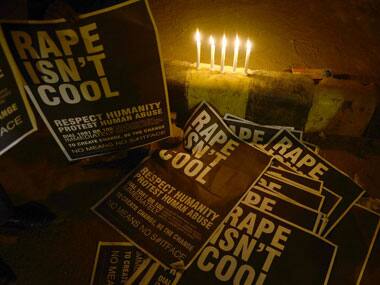Boys will be boys and boys make mistakes Mulayam Singh Yadav had famously said in the middle of a heated national debate on rape and capital punishment.
Now the MP from Mainpuri has one such “boy” among his own constituents.
Shiv Kumar Yadav, the alleged Uber rapist, is not just from Mainpuri, he has a long rap sheet of “mistakes”.
In 2003 he was charged with assault and attempt to rape at Elau police station in UP.
In 2011 he was charged with rape and robbery in Mehrauli.
In 2013 again for rape and robbery in Elau.
In between there was some arson and illegal weapons thrown in.
Inevitably questions arise about how such a person could even become an Uber driver. There are way too many “mistakes” on that CV. But the more discomfiting thought is that perhaps the mistake Shiv Kumar Yadav really regrets is the kind of woman he allegedly assaulted on that fateful night – a middle-class Uber-using professional in a finance company in Gurgaon.
None of us heard anything about those earlier stories because Elau does not register on our consciousness in the way Gurgaon does. An assault on a woman in a village hours away from the highway or someone in a chawl inside a metro is terrible but not front-page news.
Almost every high-profile rape story that has shaken the country is a middle-class metro story.
The December 2012 Delhi bus gang rape had a victim who came from a humble small-town background but could have been the poster girl of aspirational India. That terrible night she had gone to see her first English film – The Life of Pi – in a mall with a male friend. She was, her father tells the BBC “the engine of the family”. That outrage eventually resulted in laws being strengthened in parliament. Her family understands the irony that in death she provided the family with the trappings of middle class mobility – a washing machine, a new water heater, a better apartment.
The 2013 Shakti Mills rape case again involved a photojournalist in an English language publication who had gone to the deserted compound for a photo shoot. Her rapists boasted “We are evil. We have raped many girls but noone has ever caught us." When that case exploded in the news, more stories did come tumbling out about other victims. Police said they had targeted at least 10 other women in the same spot in the past six months. One was a ragpicker, another was a commercial sex worker. Most lived in the nearby slums. None of them fit the profile of women whose assaults would spur national outrage and light a fire under the police officers’ butts.
And when they want to take action our notoriously laggardly police can actually do it. In the Uber case the driver did not have the correct address on his records and his background was unverified. But still the police nabbed him and nabbed him fast.
When they are less interested, (meaning when their political masters are less interested) as happened in Kolkata’s 2012 Park Street rape case, the main accused Kader Khan can hide in plain sight. When the hoodlums also moonlight as the hired muscle of a political party that’s another layer of Teflon impunity.
It seems the only way that immunity can even be dented is when they pick on the “wrong” victim – a middle-class professional woman. Or a foreigner whose rape is a PR disaster for Indian tourism.
That’s an uncomfortable realisation bristling with prickly ideas of class privilege. As Arundhati Roy said acidly after the huge outcry over the Delhi gang rape:
Why is this crime creating such a lot of outrage? It’s because it plays into the idea of the criminal poor… you know… the vegetable vendor, the gym instructor, the bus driver actually assaulting a middle class girl.
Roy is being unfair as the blog The Atheist Indian points out. Much of that outrage was genuinely about the brutality of the attack, not the class background of the perpetrators. But it’s also true we do not have the same outrage when it comes to a soldier or a police attacking a tribal or a villager-as Manorama Devi in Manipur found out when the paramilitary picked her up in 2004.
The more pressing problem, as TheAtheistIndian writes is “that rapes and brutality of Indian women lower on the socio-economic hierarchy by upper class not only goes unpunished as Ms Roy admitted, but unnoticed as well.”
That “unnoticed” is truly the outcome of our class blinkers. And that’s what’s really disconcerting about the Delhi gang rape, the Shakti Mills rape, the Uber rape – that they are the exceptional stories not because of the actual rape but because they were noticed, splashed all over the news and followed up on. They got the fast-track media treatment because the media decided that these victims were ones their audiences and advertisers would care about.
At one level this feels sickening. Yet it’s clear that if every rape story got the media attention it deserved, we would have barely have room for any other news. When a Swiss tourist was raped in Madhya Pradesh, in the local newspaper under the headline of News about the Nation, there were eight stories. Six of them were about violence against women – a two-year-old girl in Shajapur district in Madhya Pradesh, a 16-year-old girl from Moradabad, a 37-year-old woman labourer near Indore and so on. The Swiss woman was only exceptional because her story made the front page. In the judgment of media all rapes are not created equal even though they should be.
Until now we have thought about the soft power of India’s middle class largely in terms of the goodies available to a consumer society. Or we have tracked the power of the middle class in the rise of an Arvind Kejriwal or a Narendra Modi. But now we see that soft power beyond the mall, multiplex and mantralaya. It’s one class still capable of generating enough outrage that at least gives a woman like that Uber passenger a sense that she is not disposable, that her tragedy matters.
The hard truth of this soft power is that it is myopically confined to its own class, to People Like Us. But when the news is so unremittingly bleak, this outrage, however classist, however spotty, still counts for something. One can only hope its effect will trickle down to others as well instead of just making one class feel safer while it’s open season on everyone else.
If Shiv Kumar Yadav is indeed guilty, getting him off the road does not just make other call-taxi passengers in Gurgaon a little safer. It also (unintentionally ) brings a flicker of justice to his nameless victims in faraway Elau. And one less ruffian on its streets. Maybe like a gift horse, we should not look justice too closely in the mouth.


)
)
)
)
)
)
)
)
)



